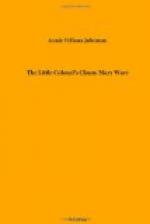Then she looked across at Ethelinda, who had arranged the windows to her satisfaction and was now stretching the electric light cord from her dressing table to her bed, so that the bulb would hang directly over it. In another moment she had propped herself comfortably against the pillows, and settled down with a book.
Mary sat up astonished. She had sacrificed her own plans and come to bed for Ethelinda’s sake, and now here was the electric light blazing full in her eyes, utterly regardless of her comfort. She was about to sputter an indignant protest when she looked up at the picture. It seemed to smile back at her as if it were a real person with whom she might exchange amused glances. “Did you ever see such colossal unconcern?” she whispered, as if the pictured Lloyd could hear.
For a moment she thought she would get up and do the things she had intended doing when she came up stairs, but it required too much of an effort to dress again, and she was more tired than she had realized after her exciting day. So she lay still. She began to get drowsy presently, but she could not go to sleep with that irritating light in her eyes. She threw a counterpane over the foot-board, but it was too low to shield her. Finally in desperation she slipped out of bed and got her umbrella. Then opening it over her she thrust its handle under the pillow to hold it in place, and lay back under its sheltering canopy with a suppressed giggle.
[Illustration: “LAY BACK UNDER ITS SHELTERING CANOPY WITH A SUPPRESSED GIGGLE.”]
Again she looked up at Lloyd’s picture, thinking, “I’d have been awfully mad if you hadn’t been here to smile with me over it.”
The bulb began to sway, throwing shadows across the wall. Ethelinda had struck the cord in reaching up to pull her pillows higher. The flickering shadows made Mary think of something—a verse that Lloyd had written in her autograph album once, because it was the motto of the Seminary Shadow Club.
“This learned
I from the shadow on a tree
That to and fro
did sway upon the wall,
Our shadowy selves—our
influence, may fall
Where we can never
be.”
She repeated it drowsily, peering out from under her umbrella at the swaying shadows, till something the lines suggested made her sit up, wide awake.
“Why, I can take you for my chum, of course,” she thought. “Your shadow-self. Then it won’t make any difference whether Miss Haughtiness Hurst talks to me or not, You’ll understand and sympathize with me.”
All her life when Mary’s world did not measure up to her expectations, she had been in the habit of making a world of her own; a beautiful make-believe place that held all her heart’s desires. It had given her gilded coaches and Cinderella ball-attire in her nursery days, and enchanted orchards whose trees bore all manner of confections. It had bestowed beauty and fortune and accomplishments on her, and sent dashing cavaliers to seek her hand when she came to the romance-reading age. Friends and social pleasures were hers at will when the lonely desert life grew irksome. Whatever was dull the Midas touch of her imagination made golden, so now it was easy to close her eyes and conjure up a make-believe chum that for the time was as good as a real one.




